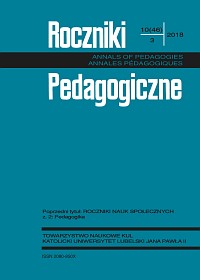Social Adaptation of Child with Chronic Illness. Case Study
Main Article Content
Abstract
Health is a state of complete physical, mental and social well-being. It is not only the absence of illness, but a full human capacity to live in harmony with the environment and to react appropriately to its changes. On the opposite side of the continuum, in line with A. Antonovsky’s salutogenic model, there is illness. In the life of every person, particularly a child, illness is a difficult situation which frequently requires to reorganise and at times also to change the functioning completely. Specific changes in this functioning are imposed by an illness that is chronic – of extended duration, incurable or recurrent. One of the serious chronic illnesses, being at the same time a genetic disease that most frequently occurs in people, is cystic fibrosis. Apart from stressors related to medical acts performed in order to treat the illness, significance of this illness for psychological and social sphere of a child development is also a relevant issue. An evaluation of the level of functioning of these spheres is implied by the level of social adaptation of a child. The article attempts to define the perception of social adaptation of an ill child by his mother and teacher, and a personal view of functioning at school of a child suffering from cystic fibrosis.
Article Details
References
Basa, A., Mocarska, D. (2008). Wpływ mukowiscydozy i choroby trzewnej na psychikę dziecka. W: B. Pawalczyk (red.), Soma i psyche. Poznań: Wydawnictwo UM.
Corazza, V., Daimler, R. (2006). Podręczna encyklopedia zdrowia. Poznań: Wydawnictwo Zysk i S-ka.
Fronczak, J. (red.) (2002). Rodzinna encyklopedia zdrowia. Warszawa: Wydawnictwo Reader’ Digest.
Góralczyk, E. (1996). Choroba dziecka w twoim życiu. Warszawa: MEN.
Kirenko, J. (1991). Psychospołeczne przystosowanie osób z paraplegią. Lublin: Wydawnictwo UMCS.
Kulesza, M. (2000). Wybrane aspekty opieki psychologicznej nad dziećmi chronicznie chorymi. Problemy Poradnictwa Psychologiczno-Pedagogicznego, 1, 12,70.
Maciarz, A. (1998). Psychospołeczne i wychowawcze problemy dzieci przewlekle chorych. Kraków: Oficyna Wydawnicza Impuls.
Sękowska, Z. (1991). Przystosowanie społeczne młodzieży niewidomej. Warszawa: WSiP.
Standardy Medyczne (2009), s. 352-353.
Polskie Towarzystwo Mukowiscydozy, http://www.pcfs.pl/
Ziółkowska, B. (2010). Dziecko chore w domu, w szkole i u lekarza. Jak wspomagać rozwój dzieci przewlekle chorych? Gdańsk: Gdańskie Wydawnictwo Psychologiczne.
Zubrzycka, R. (2005). Przystosowanie społeczne dzieci z astmą oskrzelową – zagadnieniem otwartym. W: A. Klinik, J. Rottermund, Z. Gajdzica, Edukacja – specjalizacja – autonomia w życiu osoby niepełnosprawnej (s. 42). Kraków: Oficyna Wydawnicza Impuls.
Zubrzycka, R. (2010). Rodzinne uwarunkowania funkcjonowania społecznego dzieci z astmą oskrzelową. Lublin: Wydawnictwo UMCS.
